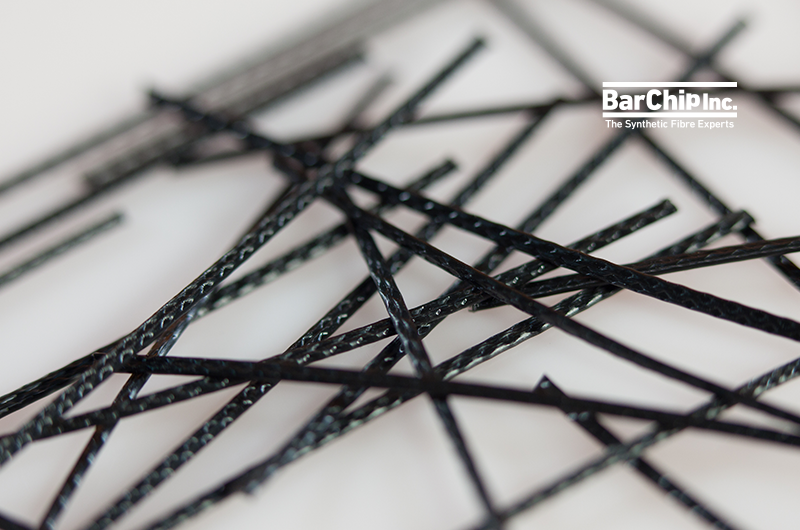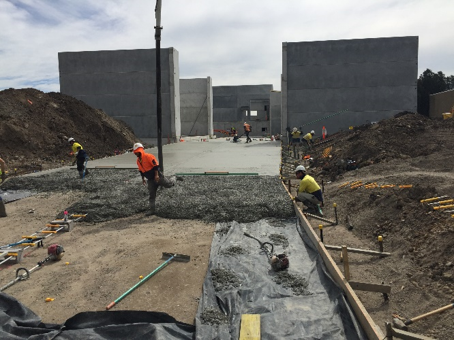Eliminate Steel Reinforcement from Concrete Paving
Affordable, Sustainable Paving Solutions Start Here.

Revolutionising Concrete Paving with Advanced Fibre Reinforcement
Concrete pavements are a cornerstone of modern infrastructure, offering unmatched durability, strength, and versatility, however, these advantages come with challenges. Traditional concrete pavement designs rely on carbon heavy materials like steel, are prone to cracking, have high installation costs and steel corrosion that leads to ongoing maintenance demands.
BarChip replaces traditional steel reinforcement with low carbon macro synthetic fibres. BarChip eliminates the risk of corrosion, accelerates construction timelines and improves crack resistance of concrete pavements. With reduced costs and a more sustainable design, BarChip fibres deliver a durable, cost-effective concrete pavement that aligns with the growing demand for greener construction practices.
Fast, Easy and Sustainable
Concrete Pavement Reinforcement
Heard Enough?
Let’s Talk About Your Project
Our guarantee is simple: with BarChip fibre, your paving will be faster to build and corrosion free, with better sustainability outcomes. Let’s talk and find out by just how much.

Get Fibre Concrete Designs in Minutes
Using custom built tools based on ACI 544 and TR34 design methods, you can quickly determine the feasibility of BarChip fibre in your project. BarChip’s free to use design app is fast, simple to use and lets you generate reports straight from the app in just minutes. Suitable for flooring, paving and shotcrete applications.
Low Carbon Concrete Pavements
Compared with steel reinforcement, BarChip fibres reduce the embodies carbon of concrete pavements. Regardless of the application, modelling shows the significant impact switching to BarChip can have.
Applications of Fibre Reinforced Concrete Paving
BarChip fibres are engineered to meet the demands of modern concrete paving applications, offering durability, crack control and sustainability. Fibre reinforcement is used in:
Roadways and Highways
Industrial Yards
Hardstands
Port and
Container Terminals
Urban and
Residential Roads
Parking Lots
Driveways
Footpaths and
Shared Paths
Specialised
Infrastructure
Jointed Plain Concrete Pavement (JPCP)
Jointed Plain Concrete Pavement (JPCP) is designed with regularly spaced contraction joints to manage concrete shrinkage and control concrete cracking. BarChip fibres are regularly used in JPCP designs for improved durability, ductility and crack control.
Continuously Reinforced
Concrete Pavement (CRCP)
Continuously Reinforced Concrete Pavement (CRCP) uses continuous steel reinforcement to manage tightly spaced controlled cracks, without the need for transverse joints. This design is ideal for heavy traffic applications such as roads or weigh stations. BarChip fibre replaces steel reinforcement in CRCP, eliminating corrosion risks, lowering the carbon footprint, and providing superior crack control for long lasting sustainable pavements.


Roller-Compacted Concrete
Pavement (RCC)
Roller-Compacted Concrete Pavement (RCC) is a no-slump concrete mix compacted with heavy rollers and is regularly used for heavy duty applications such as industrial yards, port terminals and storage areas. BarChip streamlines RCC construction by eliminating steel reinforcement and any risk of corrosion, an important consideration for many external RCC concrete pavements.

Slipform Paving
Slipform Paving uses specialised machines to continuously extrude concrete pavements. This method ensures efficient, high-precision construction. BarChip fibres integrate seamlessly into slipform paving with little to no impact on machine operation.
Frequently Asked Questions
What types of pavements use fibre reinforcement?
Fibre reinforcement is ideal for roads, external hardstands, footpaths, cycleways, driveways, industrial yards and parking areas.
Why are fibres used in concrete pavements?
BarChip fibre eliminates steel mesh reinforcement from pavements for reduced construction time and cost. BarChip improves crack control and removes corrosion risk for long term durability.
Is fibre reinforcement suitable for heavy duty pavements?
Yes, fibre reinforced concrete withstands heavy loads and high traffic areas such as external hardstands, industrial pavements, port facilities and roads.
How does fibre reinforcement compare to steel mesh in concrete pavements?
Fibres provide 3-dimensional reinforcement across the entire concrete cross section for improved ductility and better crack control compared with traditional mesh reinforcement.
Can fibre be used in thin concrete pavements?
Yes, fibre improves performance in thinner pavement sections by enhancing toughness and crack control.
What is the typical dose rate of fibre reinforcement in concrete pavement?
Fibre performance varies, so dose rates should be determined based on performance specifications. For BarChip, the typical dose rate in concrete pavements is 3kg/m3 to 6 kg/m3 .
Can fibre be used in slipform pavements?
Yes, fibre is compatible with slipform paving. Proper mix design ensures smooth extrusion and consistent pavement finish without affecting machine operation.
Do fibres stop cracking in concrete pavements?
Fibres improve the residual capacity of concrete and improve the control of cracking, reducing crack propagation and extending the service life of pavements.
Get in touch for a personal information session about your next project. One of our concrete fibre experts will guide you through the following 4 keys items:





















